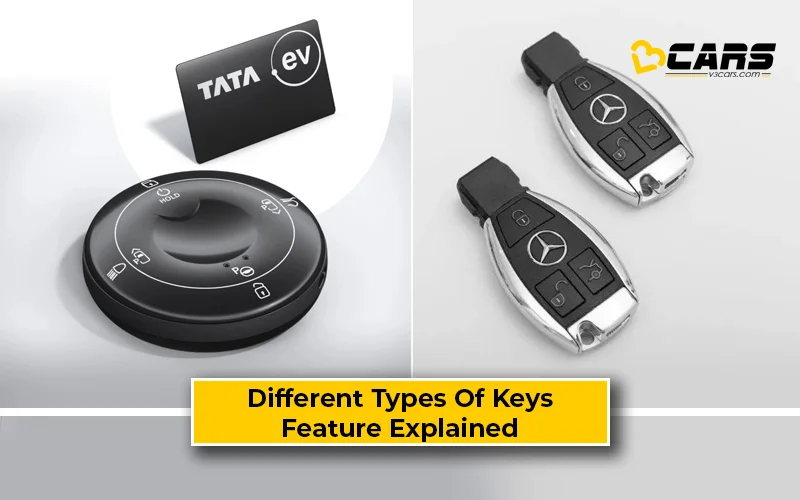Different Types Of Car Keys – Feature Explained
Car keys have come a long way from simple metal blades. Today, they are sophisticated pieces of technology that offer varying levels of convenience, security, and integration with your car. Let’s explore the different types of car keys you'll find.

1. Normal Key (Traditional Key)
What is a Normal Key? This is the most basic type of car key, consisting of a metal blade with a unique cut that matches the car’s lock cylinders and ignition.
How does it work? You manually insert the key into the door lock to unlock the car and into the ignition cylinder to start the engine. The mechanical cuts on the key engage with the tumblers in the lock, allowing it to turn.
What Are The Pros And Cons Of a Normal Key?
Pros:
- Simplicity: Easy to understand and use.
- Durability: Less prone to electronic malfunctions.
- Affordability: Cheapest to replace if lost.
Cons:
- Low Security: Easier to duplicate or pick compared to modern keys.
- No Remote Functions: Requires manual locking/unlocking.
- Less Convenient: Not as user-friendly as electronic keys.
Can a Normal Key be installed from the aftermarket? No, a normal car key cannot be “installed” as it’s a mechanical component. However, new normal keys can be cut by locksmiths or dealerships if you have the key code or an existing key to duplicate.
Affordable cars in India that offer a Normal Key? Many entry-level cars and commercial vehicles still come with normal keys, especially in their base variants. Examples include the older Maruti Suzuki Alto, some Tata Ace models, and other basic utility vehicles.
2. Foldable Key (Flip Key)
What is a Foldable Key? A foldable key combines a traditional metal blade with a remote locking/unlocking fob, where the key blade can be folded or “flipped” into the fob when not in use.
How does it work? The remote buttons are used for locking, unlocking, and sometimes opening the boot. To start the car or manually open a door, you press a button to release the metal blade, which then functions like a normal key.
What Are The Pros And Cons Of A Foldable Key?
Pros:
- Convenience: Offers remote locking/unlocking.
- Compact: The foldable design protects the key blade from damage and makes it easier to carry in pockets.
- Improved Aesthetics: Looks more modern than a standalone remote and separate key.
Cons:
- Mechanical Wear: The folding mechanism can wear out over time.
- Higher Replacement Cost: More expensive than a normal key due to integrated electronics.
Can a Foldable Key be installed from the aftermarket? Yes, for many cars that originally came with a separate key and remote, aftermarket foldable key fobs are available. These require transferring the internal electronics from your original remote and cutting the new blade to match your car.
Affordable cars in India that offer a Foldable Key? Foldable keys are very common in India. Many mid-range variants of popular hatchbacks and sedans offer them, such as:
- Maruti Suzuki Swift (mid-variants)
- Hyundai Grand i10 Nios (mid-variants)
- Tata Punch (mid-variants)
- Renault Kwid (top variants)
3. Remote Key (Integrated Remote Key)
What is a Remote Key? A remote key integrates the car’s remote locking and unlocking functions directly into the head of a fixed-blade key.
How does it work? The remote buttons send radio signals to the car’s receiver to lock/unlock doors and the boot. The fixed metal blade is used for ignition and manual door locks, similar to a normal key.
What Are The Pros And Cons Of A Remote Key?
Pros:
- Convenience: Provides remote access to vehicle functions.
- Simple Operation: Straightforward button-press for locking/unlocking.
Cons:
- Fixed Blade: The blade is always exposed, potentially causing wear or poking pockets.
- Replacement Cost: More expensive than a normal key due to integrated electronics.
- Battery Dependent: Remote functions rely on a small battery inside the fob.
Can a Remote Key be installed from the aftermarket? Similar to foldable keys, if your car originally came with remote functionality, aftermarket replacements or spares can be acquired and programmed.
Affordable cars in India that offer a Remote Key? Many entry-level to mid-range cars offer remote keys in their higher-end variants:
- Maruti Suzuki Alto K10 (top variant)
- Tata Tiago (mid-variants)
- Hyundai Exter (mid-variants)
4. Smart Key (Keyless Entry/Go)
What is a Smart Key? A smart key, often called a proximity key or keyless entry/go system, is a fob that doesn’t require direct insertion into the ignition or manual button presses to unlock doors.
How does it work? The car detects the smart key’s presence when it’s within a certain range (eg: close to the door or inside the cabin). You can unlock the doors by touching the door handle and start the engine by pressing a start/stop button, all while the key remains in your pocket or bag.
What Are The Pros And Cons Of A Smart Key?
Pros:
- Ultimate Convenience: Keyless entry and engine start.
- Enhanced Security: Uses rolling codes and encrypted signals, making it harder to hack.
- Modern Feel: A premium and seamless user experience.
Cons:
- High Replacement Cost: Most expensive to replace due to complex electronics.
- Relies on Battery: If the key fob battery dies, manual entry/start might be required (often using a hidden physical key blade).
- Security Concerns (Relay Attacks): Though highly secure, advanced thieves can sometimes use “relay attack” devices to trick the car into thinking the key is closer than it is.
Can a Smart Key be installed from the aftermarket? Installing a full smart key system from the aftermarket is extremely complex and generally not recommended. It requires deep integration with the car’s immobilizer, ECU, and security modules. Aftermarket “keyless start” kits exist but rarely offer the same level of integrated security and reliability as factory systems.
Affordable cars in India that offer a Smart Key? Smart keys are increasingly common in compact SUVs, sedans, and premium hatchbacks in their higher variants:
- Hyundai Creta (mid-to-top variants)
- Kia Seltos (mid-to-top variants)
- Tata Nexon (mid-to-top variants)
- Maruti Suzuki Brezza (mid-to-top variants)
5. Wearable Key
What is a Wearable Key? A wearable key is a smart key integrated into a device worn on the wrist, such as a smartwatch or a special wristband.
How does it work? It functions like a smart key, using proximity to unlock doors and allow engine start. The wearable device acts as the key fob, offering hands-free convenience.
What Are The Pros And Cons Of A Wearable Key?
Pros:
- Maximum Convenience: No need to carry a separate key fob, especially useful during activities like sports.
- Stylish: Blends technology with personal accessories.
Cons:
- Limited Availability: Currently offered by only a few manufacturers on select models.
- Battery Life: Dependent on the wearable device’s battery.
- Replacement Cost: Very expensive to replace.
Can a Wearable Key be installed from the aftermarket? No, wearable keys are a highly integrated factory feature specific to certain car models. They cannot be installed from the aftermarket.
Affordable cars in India that offer a Wearable Key? Currently, wearable keys are a niche offering in premium segments or specific variants. Examples include:
- Kia Seltos (in some top variants)
- Hyundai Creta (in some top variants)
6. Digital Key or Smartphone Key
What is a Digital Key or Smartphone Key? A digital key allows your smartphone (or sometimes a smartwatch) to function as your car key, using technologies like NFC (Near Field Communication), Bluetooth, or UWB (Ultra-Wideband).
How does it work? After setting up the digital key via a car manufacturer’s app, you can:
- Unlock/Lock: Tap your phone to the door handle (NFC) or simply approach the car (Bluetooth/UWB).
- Start Engine: Place your phone in a designated tray or simply have it inside the cabin.
- Share Keys: Digitally share access to your car with others via the app.
What Are The Pros And Cons Of a Digital Key or Smartphone Key?
Pros:
- Ultimate Convenience: No physical key needed; your phone is always with you.
- Key Sharing: Easy to share car access securely with family or friends.
- Theft Deterrence: Harder to “steal” a digital key than a physical one.
Cons:
- Phone Battery Dependency: If your phone battery dies, you’re locked out.
- Phone Security: Requires strong phone security (passcode, biometrics) to protect car access.
- Limited Compatibility: Only available on newer, tech-advanced models and specific phone models.
- Cybersecurity Risk: Potential for digital vulnerabilities, though manufacturers employ strong encryption.
Can a Digital Key or Smartphone Key be installed from the aftermarket? No, digital key functionality is an incredibly complex, factory-installed system that requires deep integration with the car’s security, infotainment, and communication modules. It cannot be installed from the aftermarket.
Affordable cars in India that offer a Digital Key or Smartphone Key? This is a relatively new and premium feature, but it's becoming more common in higher-segment cars:
- Higher-end models from luxury brands like BMW and Mercedes-Benz.
Also Read: Front Parking Sensors - Detailed Feature Explained
Helpful Tools:
- Fuel Cost Calculator for Cars – Know your monthly fuel expense based on usage and mileage
- Car On-Road Price Calculator – Convert ex-showroom to on-road price for any city
Sell Used Car Online – Enter your car and contact details to get an instant price estimate and book a free inspection with our partner network


0 Comments